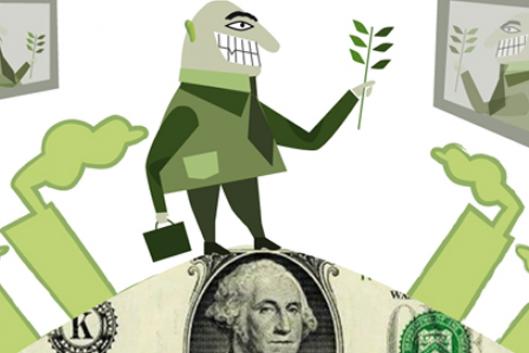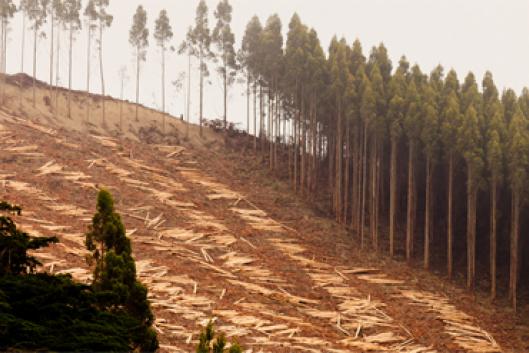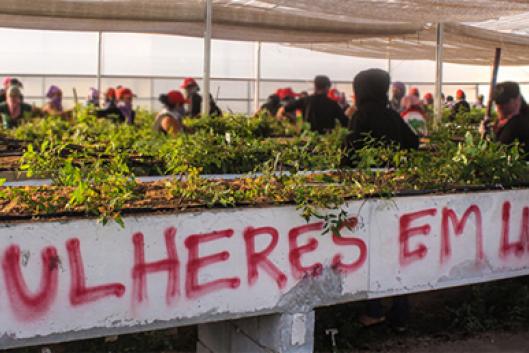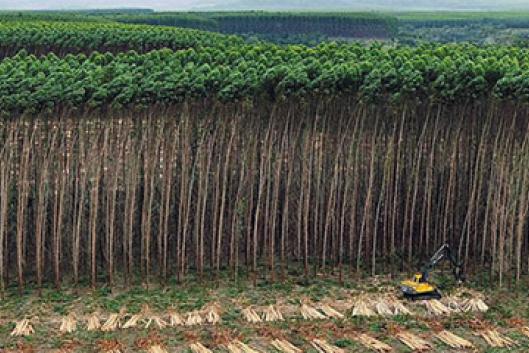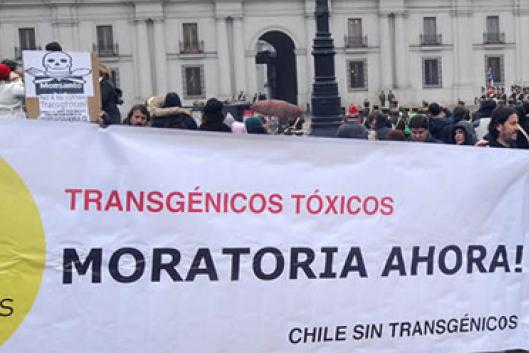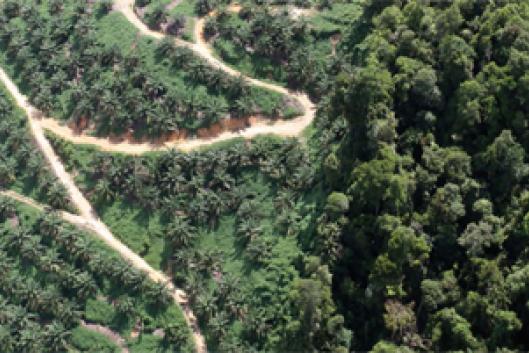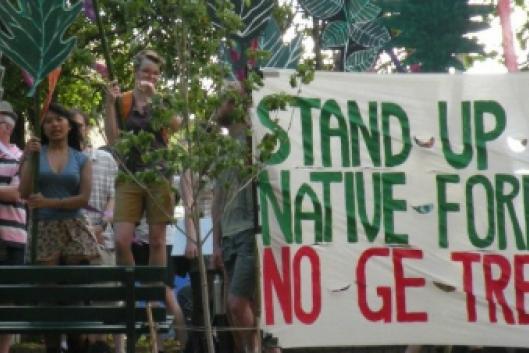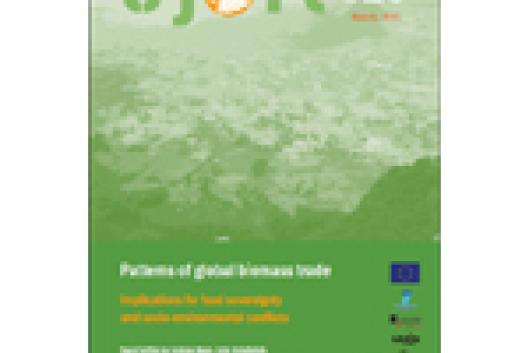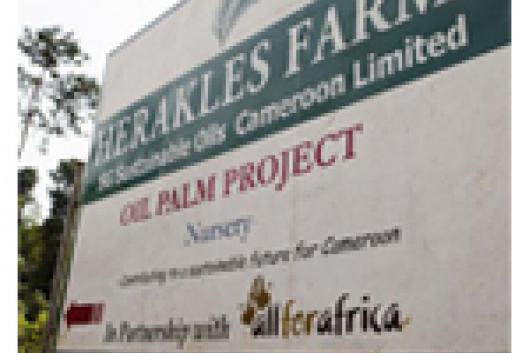For several years now the Food and Agriculture Organization of the United Nations (FAO) has celebrated the International Day of Forests on March 21. This year’s theme is: “Forests, Climate, Change.” But the changes we see that the FAO promotes only increase the problems of the peoples who depend on forests, such as the trend in Southern countries, like China, Malaysia, Brazil and Chile, to promote commercial plantations of genetically engineered trees.
Bulletin Issue 212 – March 2015
Artificial trees? The forestry and paper industry searching for new ways to expand industrial monocultures
WRM Bulletin
212
March 2015
OUR VIEWPOINT
ARTIFICIAL TREES? THE FORESTRY AND PAPER INDUSTRY SEARCHING FOR NEW WAYS TO EXPAND INDUSTRIAL MONOCULTURES
-
10 April 2015In September this year, the Food and Agriculture Organization of the United Nations (FAO) is organizing the XIV World Forestry Congress, this time to be held in the African continent, in Durban, South Africa. This Congress is the most significant gathering that FAO organizes in relation to forests and is held every six years. But, what sort of “forests” are been talked about here? What does the Congress pretend to achieve, and what impacts could it have on the African continent, especially thinking on the communities and peoples who depend on the forests?
-
-
10 April 2015There are many reasons why it is essential to oppose the introduction of transgenic trees, such as their impact on forests, biodiversity, lands and the people who inhabit them. One reason is that contamination with transgenic pollen from these trees is utterly uncontrollable. Although this could be used as an argument for banning them, it is now used by their promoters to push through yet another nightmare: the so-called Terminator technology, originally developed to create “suicide seeds.”
-
10 April 2015Stora-Enso, a giant Swedish-Finnish industrial forestry company and one of the largest producers of pulp and paper in the world, is anxious to forge ahead with research into genetically modified (GM) trees. The vast industrial tree plantations Stora Enso owns in Latin America and Asia have already been causing multiple violations of environmental and human rights (1). A survey made public in 2014 by The Forests Dialogue, a multi-stakeholder platform, revealed that the company intends to expand its production even further, likely with GM trees (2).
-
10 April 2015Transgenic forestry in Chile is shrouded in mystery, secretiveness and corporate lobbies. While state agencies deny that transgenic trees have been released into the environment, laboratories, universities and companies devoted to forestry-related biotechnology multiply in the country, supported by public funds. Schizophrenia, a sudden scientific interest or reprehensible political irresponsibility?
-
10 April 201530 years ago, during FAO's World Forestry Congress in Mexico in June 1985, the Tropical Forestry Action Plan (TFAP) was adopted as the new international framework for forest-related action (1). In November of the same year, representatives of bilateral and multilateral donor agencies, supported by some international NGOs, also accepted the TFAP (later renamed into Tropical Forests Action Programme) as a framework for their bilateral and multilateral activities and funding related to tropical forests.
PEOPLES IN ACTION
-
-
10 April 2015In an unprecedented and alarming move, the United States Department of Agriculture has given GE tree company ArborGen permission to pursue commercial production of a genetically engineered loblolly pine with no regulatory oversight or environmental risk assessment. In the current plan, the potential impacts to the public or to the environment will not be evaluated. This decision sets a terrible and unacceptable precedent.
-
RECOMMENDED
-
10 April 2015A new report by EJOLT, an alliance of academic and activist groups struggling for environmental justice, analyses the increasing global biomass trade and highlights its impacts. The report examines the global evolution of food production and international food trade and identifies related drivers of socio-environmental conflicts. Looking at the history and causes of the oil palm industry in Indonesia, the soy monocultures in Paraguay and large land investments in Ethiopia, the case studies help to illustrate the broader patterns in the global biomass trade.
-
10 April 2015The Global Alliance for Climate-Smart Agriculture was launched on September 2014, at the UN Climate Summit in New York. This alliance is the outcome of years of determination by FAO and the World Bank to get the concept of “climate-smart agriculture” onto the international agenda, together with the ideological context and policies it implies. Behind the reasonable and virtuous image of a climatically benign agriculture, priority is being given to approaches like biotechnology and offsets for greenhouse gas emissions, rather than to the knowledge and experience of small-scale farmers who protect the environment and climate.
-
10 April 2015The latest Nyéléni newsletter edition shows articles on how peoples across the world are fighting to secure and defend their rights to “natural resources” and the rights of nature, providing valuable information about tools that can be used to strengthen our struggles. You can download the newsletter (in English) here: http://nyeleni.org/DOWNLOADS/newsletters/Nyeleni_Newsletter_Num_21_EN.pdf
-
10 April 2015Aljazeera’s People and Power TV program released a video on the social and environmental consequences of oil palm plantations in Cameroon, where the government has been trying to attract the palm oil industry by offering a number of incentives. For example, in 2010, the Cameroonian government struck the outlines of a deal with a US-based enterprise called Herakles Farms, granting it exclusive use of a biodiversity hotspot in south-western Cameroon - an area covering 73,000 hectares of pristine forest with communities and farmland inside - to start plantations. Impacts are already starting to be felt.
